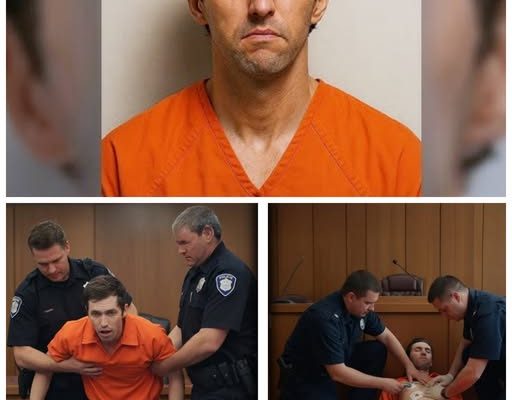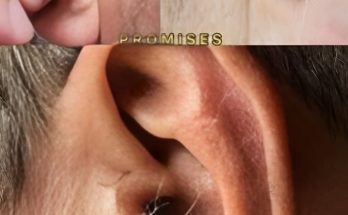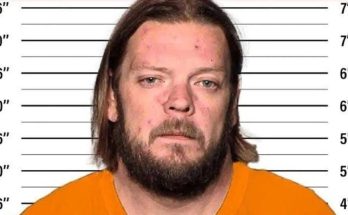
Gasps filled the room. The jurors flinched. Even the guards hesitated, unsure if what they were witnessing was physical shock or the visible unraveling of a man’s soul.
For months, Charlie had maintained a facade — cold, distant, unbothered. He had stared down prosecutors with that blank expression that made people wonder if he felt anything at all. But in that moment, the mask disintegrated. The arrogance, the composure, the illusion of control — gone. What lay on the floor wasn’t a monster or a martyr. It was just a man, terrified and broken, facing the inescapable truth that his life was now measured in months, maybe weeks.
The courtroom seemed to shrink around him. Lawyers stood frozen, the judge looked down with a face carved from stone, and the audience watched in a collective trance. It wasn’t just justice being delivered — it was the raw spectacle of humanity colliding with consequence.
Charlie lay there motionless for a few seconds before his shoulders began to shake. Whether it was from crying or trembling no one could tell. The guards finally stepped forward, lifting him to his feet. His eyes darted aimlessly — wild, searching — like he was trying to find something to anchor himself to, something that would make it all make sense. But there was nothing.
This was the moment every headline had been building toward, the climax of a story that began the night he pulled the trigger. For weeks after the shooting, he had shown no remorse. Prosecutors painted him as cold-blooded. The defense argued mental instability. Psychologists testified about trauma, rage, and the fragile wiring of a mind pushed past its limits. But none of it mattered anymore. The verdict was final. The story was over — or so it seemed.
As the bailiffs escorted him out, Charlie stumbled again, his body resisting what his mind could no longer deny. A reporter later described it as “the sound of justice landing — not on the guilty, but on the human beneath the guilt.”
Outside the courthouse, protestors stood divided — some demanding justice, others decrying the death penalty. To them, Charlie Kirk Shooter was a symbol, not a person. Inside, though, the people who had seen the collapse felt something different — a strange mix of closure and discomfort. They had witnessed a life end before it actually ended.
For the families of his victims, it was complicated. One mother, whose teenage son had been killed, said softly to a journalist, “I thought I’d feel peace hearing the sentence. But seeing him fall like that… it just made me sad. He looked so small.”
That’s the cruel paradox of justice. The system may deliver closure, but it rarely delivers comfort.
Psychologists who later reviewed the footage of the courtroom described Charlie’s collapse as a textbook psychological response — an extreme physiological reaction to irreversible finality. “It’s the mind’s defense mechanism shutting down under existential shock,” one expert said. “When a person realizes, with absolute certainty, that there’s no escape, no appeal, no future — the body often reacts before the brain can process it.”
It’s easy to dehumanize the condemned, to see them as their crimes and nothing more. But in that moment, Charlie’s breakdown forced everyone to confront an uncomfortable truth: even the worst among us are still human. His fall wasn’t dramatic or defiant; it was hollow, helpless — the collapse of a man who finally understood what he had done and what it had cost.
The courtroom itself, sterile and indifferent, became a kind of theater for tragedy. The gleam of the judge’s gavel, the scrape of chairs, the shifting of feet — all became part of a scene that would replay endlessly in the minds of those who were there. The journalists wrote about it, the pundits debated it, and the public devoured it. But for the people who saw it firsthand, the memory lingered with an uneasy weight.
Weeks later, footage from that day circulated online. Clips of Charlie’s knees giving out. His face in the split second before he hit the ground. Comment sections filled with mockery, anger, and applause — but also with quiet, unexpected pity. “That’s what real fear looks like,” one comment read. “He finally understood.”
Whether that understanding was too little too late didn’t matter. For some, it was justice. For others, it was tragedy. For most, it was both.
Behind bars, Charlie remained silent. His legal team filed the expected appeals, but insiders said he barely spoke to anyone, eating little, sleeping less. One prison guard described him as “a ghost in a living body.”
The human brain can only handle so much remorse, and for Charlie, remorse arrived not as a moral awakening but as an avalanche. He began writing letters — to the victims’ families, to his own estranged parents, even to the judge. Most went unanswered. Some were returned unopened. But he kept writing, as if confessing to paper could undo what he’d done.
Months later, when reporters revisited the story, they found a public already moving on. New headlines had replaced the old. The world had absorbed Charlie Kirk Shooter’s story, digested it, and moved to the next scandal. But inside the penitentiary walls, time stood still. Every day was the same — long, quiet, and filled with the echo of a gavel that had already fallen.
In the end, that’s what the courtroom scene became: not just the sentencing of one man, but a haunting reflection of what justice looks like when stripped of spectacle. It was a reminder that punishment and peace are not the same, that closure comes at a cost, and that the line between guilt and grief is often razor-thin.
Charlie Kirk Shooter’s collapse will be remembered — not just for its drama, but for what it revealed. Beneath the crimes, the courtroom battles, and the headlines, it showed the one truth that binds all people, guilty or not: when faced with the full weight of consequence, every human being breaks the same way.
And in that silent courtroom, amid the gasps and the gavel’s echo, what the world witnessed wasn’t just the end of a trial. It was the moment a man finally met the gravity of his own choices — and fell beneath them.



